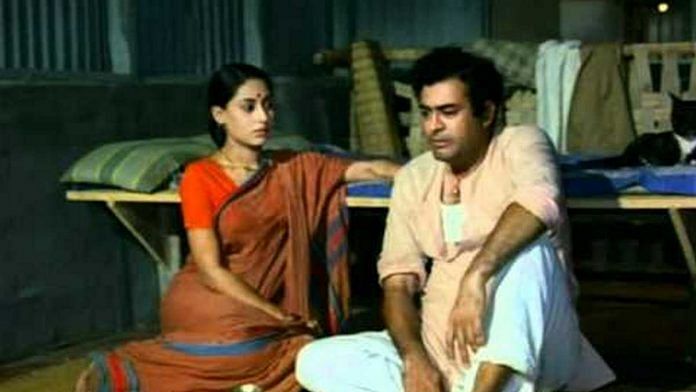There’s a scene in Koshish in which Aarti (Jaya Bhaduri) and Hari (Sanjeev Kumar), a deaf-mute couple, are arguing while walking home together. Without subtitles and familiarity with sign language, it’s easy to miss the precise nuances of why they are fighting. But if you think about it, isn’t that true of all marriages? We never really know what goes on in someone else’s marriage, and this couple’s disabilities make their equation no different.
In many ways, this is the underlying message of Gulzar’s career-defining movie (he wrote and directed it) – that someone’s disability should be treated as just another aspect of their life, not ignored, but not pitied, ridiculed or othered in any way. Their way of experiencing life might be different, but their experience is in no way less. So when the two of them sit at the beach with their new friend Narayan, who is blind, and watch the sunset, Narayan can’t see the big fiery golden ball dipping into the sea but he can describe it. Hari and Aarti can see the sunset, but can’t hear what Narayan is saying. Yet, the three manage to communicate perfectly with each other about the beauty of the moment.
Scenes like these make Koshish a truly special movie. At just under two hours, the film is crisp even by today’s standards, and manages to portray a number of themes and characters. There’s Durga (Dina Pathak), Aarti’s loving mother who occasionally gives in to pity but remains strong and jovial for the sake of her daughter. Kanu (Asrani) — Aarti’s greedy brother — is the villain of the piece who steals from her to gamble and eventually, is the cause of the death of Hari and her first child. (One doesn’t miss the fact that the name Kanu is rather similar to the other evil mama, Kans.)
The story of how Aarti and Hari meet, court and marry takes up much of the movie’s first half, and has some incredibly cute bits, notably the one in which they ‘blank-call’ random numbers from a public phone booth. This scene also features a lovely cameo by Dilip Kumar, presumably playing himself — he walks down a sweeping staircase and looks irritated that none of his staff is around to pick up the ringing phone so he has to do it himself. When Hari grunts into the receiver at the other end, Kumar irritatedly says “Yeh toh mujhse bhi maddham bolta hai” (He speaks even more softly than me). It’s a clever dig from an actor known for his quiet performances to another, younger actor, also known to be understated.
Later, when tragedy strikes and they lose their son, they deal with it in an equally understated, yet completely believable manner. No chest-beating grieving, no recriminations. Just the knowledge that life, sometimes despite our best efforts, goes on. Hari loses his job as a newspaper delivery boy (Kanu has stolen his cycle along with Aarti’s wedding jewellery) but works as a shoe polisher until he manages to work his way up in a printing press. They have a second child, a son whom they name Amit, who grows up with perfect hearing and speech, and is an English literature graduate keen to do a masters. Just life, going on.
The simplicity and quietude of these moments also make the conclusion of the film jarring and inconsistent with the rest of it. Amit, is bullied by his father into agreeing to marry his (Hari’s) boss’ daughter, who is deaf-mute. It’s odd, because initially, Aarti had turned down Hari’s proposal assuming it came from a place of pity or him seeing her as his best option. Yet, when Amit says he doesn’t want to marry this girl, his father doesn’t get that his son might want to marry for love and guilts him into accepting.
Also, when the boss first mentions the idea, Hari’s initial concern is the difference in their socioeconomic class. It is only when he finds out that the woman is also deaf-mute that he thinks the difference can be bridged and he accepts the proposal on behalf of his son. The whole scene reeks of a strange and problematic idea of equality, duty and marriage, which is even stranger given the tone and tenor of the rest of the movie.
The one thing that holds the weak scene together is Sanjeev Kumar’s masterful performance. His eyes, his hands and the slump of his shoulders communicate his rage and heartbreak so beautifully that no words are needed. In the week that saw his 34th death anniversary, there is, perhaps, no better film to watch again.
Also read: Godfather & Love Story producer Robert Evans, the ‘charming Hollywood playboy’, dies at 89



